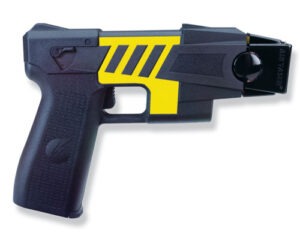On September 26, 2009, Deshun Carter was barbequing in front of his house with his mother, father, and wife. Two officers arrived and told him to turn down the music coming from his vehicle. Carter immediately complied and told the officers that he was sorry for the music and wasting their time. He identified himself as the owner of the house and the vehicle, and gave the officers his identification. When an officer turned to run warrant checks, Carter stepped back toward his grill because his meat was burning. The officer became irate and shouted, “Where the fu** do you think you’re going – I’m not done with you yet.”
Carter responded that he wasn’t going anywhere and was just checking his meat. The officer charged Carter, grabbed him, and slammed him against Carter’s front fence. His partner maced Carter in the face, while the first officer drew his taser and tased Carter, sending 50,000 volts of electricity through his body. The officers handcuffed Carter, arrested him, and charged him with disorderly conduct and obstructing the legal process. A jury acquitted Carter of all charges.
For a legal consultation, call 612-349-2729
I represented Carter in a civil suit under 42 U.S.C. 1983 for damages arising from the violation of his Fourth Amendment right to be free from unreasonable search and seizure. In order to prevail, we needed to show that the officers’ conduct was “objectively unreasonable.” In making this determination, the following factors are relevant: 1) the severity of the crime at issue: in this case, it was a minor noise ordinance violation that had been voluntarily corrected by Carter; 2) whether the suspect poses an immediate threat to the officers: Carter had no weapons and was simply barbecuing with his family in broad daylight on a sunny afternoon; and 3) whether the suspect is attempting to resist or evade arrest: Carter was standing in front of his own house. Click here to read the Court’s order denying summary judgment to the officers and ordering a trial.
On April 16, 2012, a federal jury returned a verdict finding excessive force and awarded Carter $35,000 in punitive damages.
I was honored to represent Deshun. He’s a courageous and tenacious young man, who fought for three years to get his case to trial. He was pleased with the monetary result of the trial, but more pleased that the matter has been resolved and he can now turn the page and move on with his life.
Please note that every case is different, with its own unique facts. Just because Deshun won a jury verdict in his case does not mean that you will win a jury verdict in your case. If you’d like to discuss the particular facts of your police brutality case, please contact Madia Law.
Call 612-349-2729 or complete a Case Evaluation form


